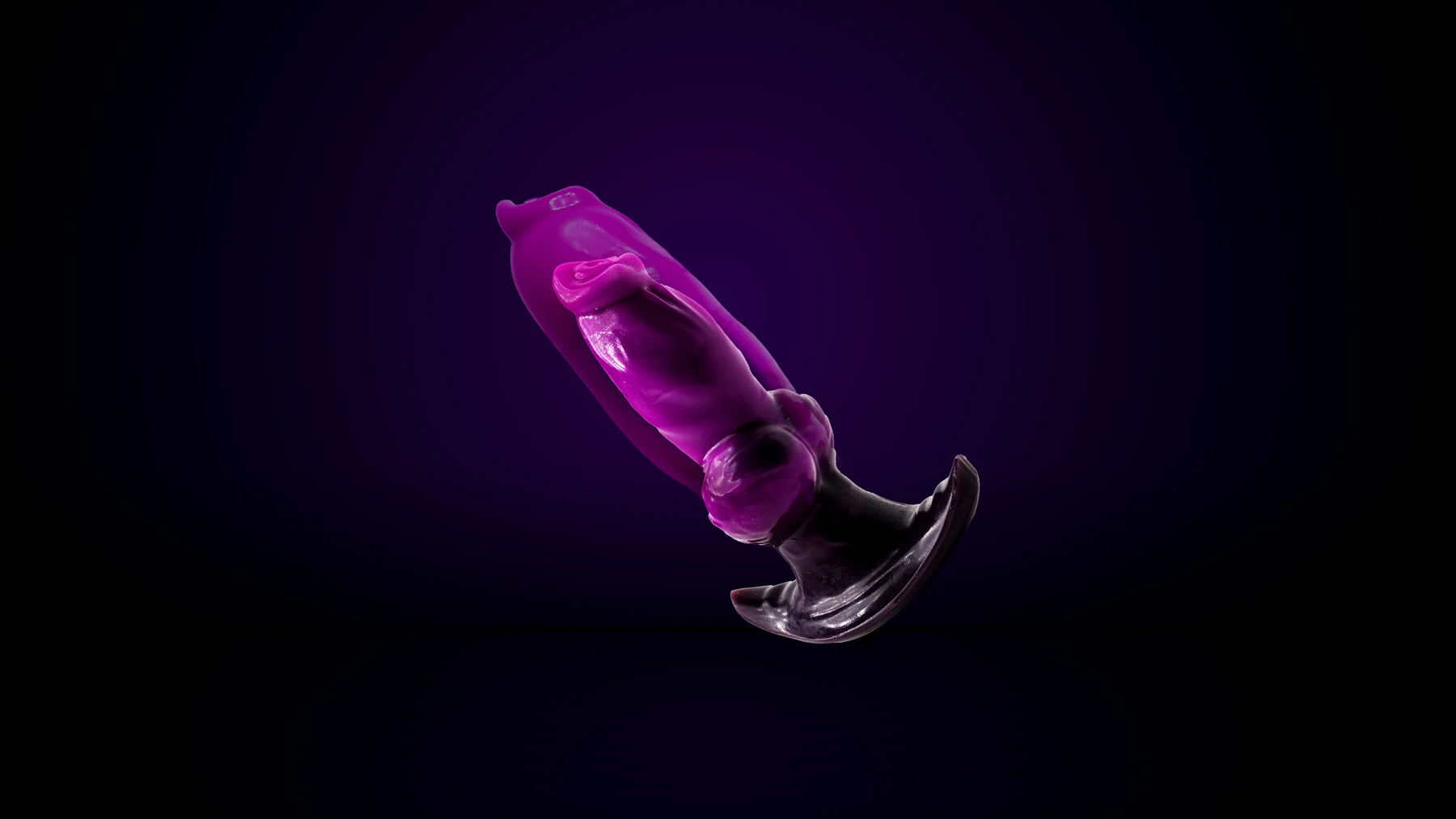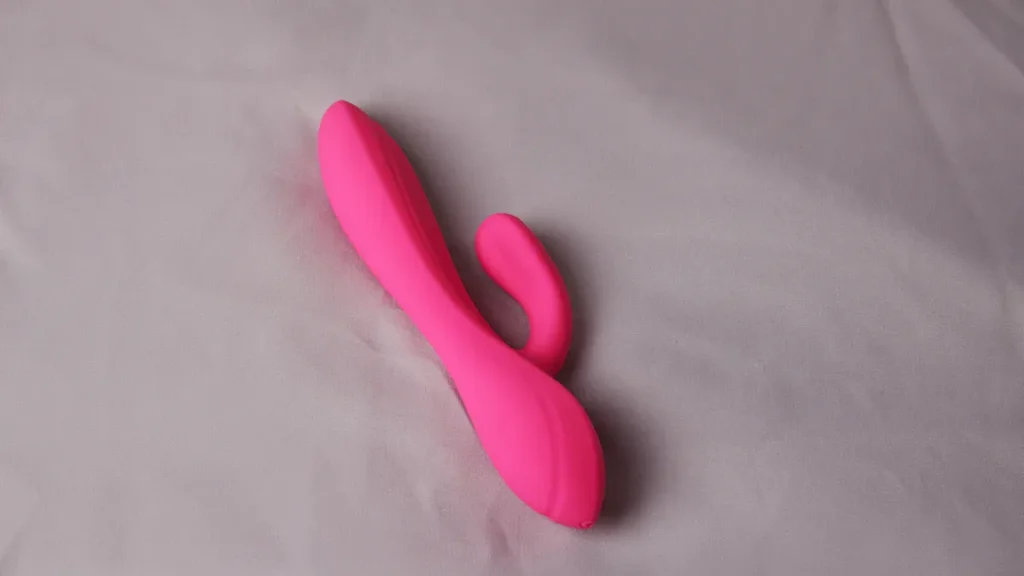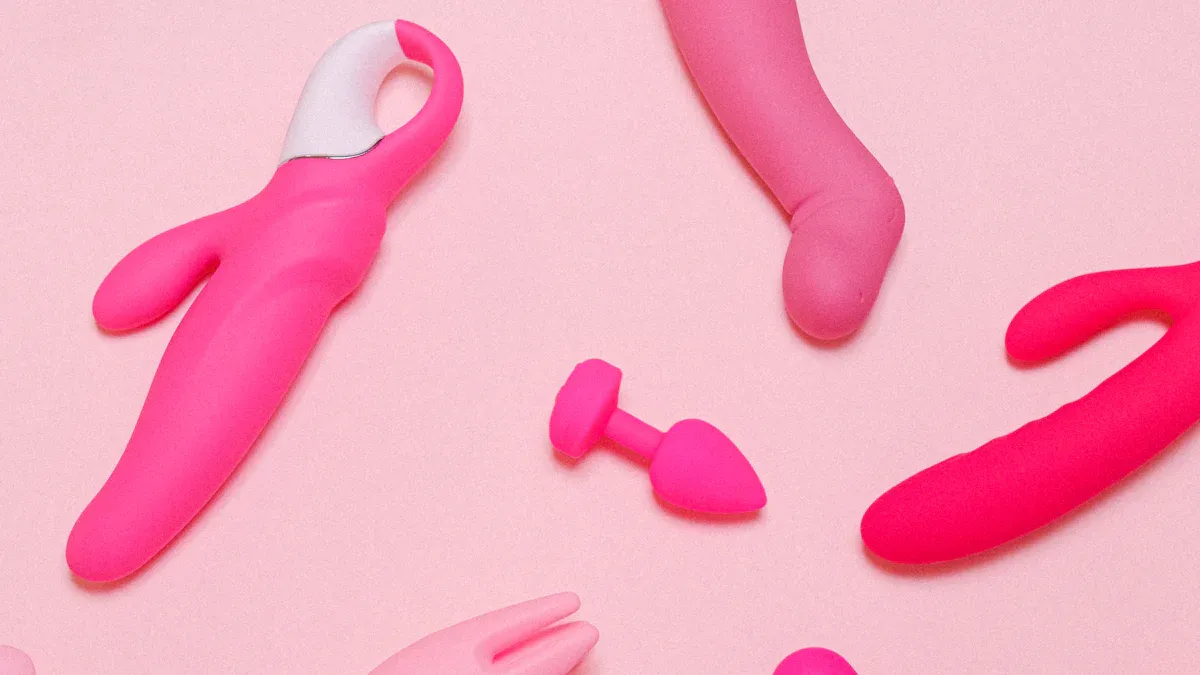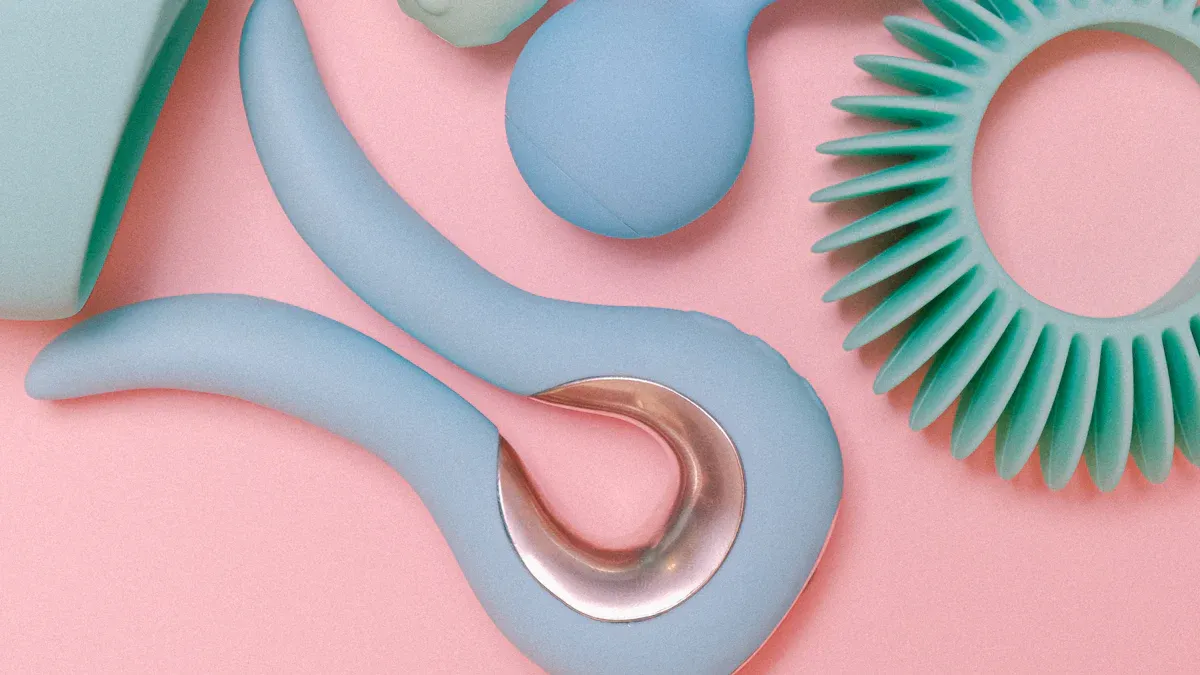Plastic Dildos Explained and How They Stand Out from Other Options
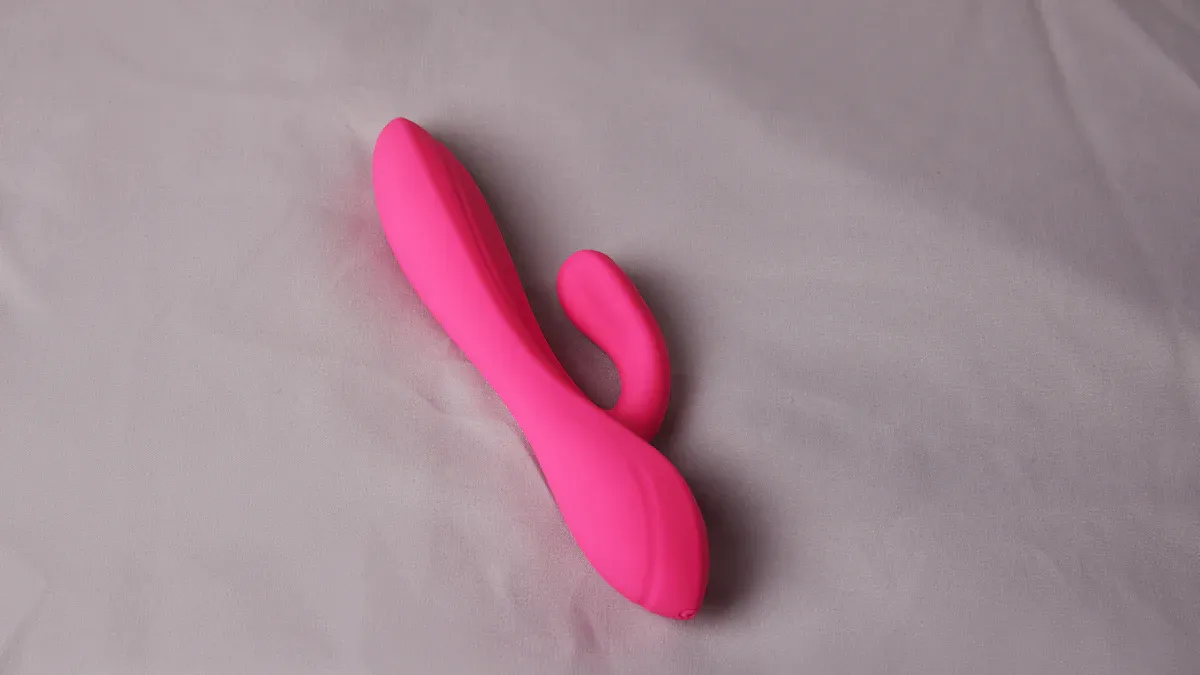
Plastic dildos use hard, smooth plastic to create a firm shape. You often see them as part of adult toys because they come in many styles, like Tentacle Dildos, Triple Dildos, and even Luminous Dildos. The kind of material in dildos matters for your safety and comfort. Some dildos use body-safe materials, while others do not. When you look at different types of sex toys, you want to know how easy they are to clean and how they feel.
What Are Plastic Dildos?
Key Features
Plastic dildos are made from hard, smooth plastic. They keep their shape and feel solid. Most use ABS plastic. ABS is special because it does not have tiny holes. It also does not have phthalates, which are bad chemicals. You can clean ABS plastic without much trouble. It does not soak up fluids or germs. This makes it safer for your body.
Some dildos use TPE, TPR, or PVC plastic. These types feel softer and bend more. But they can be less safe. TPE and TPR have tiny holes that can trap germs. This makes them hard to clean. PVC often has phthalates and other harmful chemicals. Studies from Denmark and Germany found high phthalate levels in some sex toys. ABS plastic did not have this problem. Sometimes, boxes say “phthalate-free,” but the toy may still have phthalates inside.
Tip: Always check what the dildo is made of before you buy. Nonporous materials like ABS plastic are safer and easier to clean.
Here is a quick comparison of common plastics used in dildos:
Material | Porous? | Phthalate-Free? | Cleaning Difficulty | Safety Level |
|---|---|---|---|---|
ABS | No | Yes | Easy | High |
TPE/TPR | Yes | No | Hard | Low |
PVC | Yes | No | Hard | Low |
How They Differ
Plastic dildos are different from other sex toy materials. ABS plastic feels hard and does not bend much. If you want strong pressure, this is good. Other materials, like silicone, glass, or metal, feel different. Silicone is softer and feels more real. Glass and metal are smooth and cool but also heavy.
Safety is important to think about. ABS plastic does not have tiny holes and does not have phthalates. This means it is less likely to cause problems. TPE, TPR, and PVC can soak up fluids and germs. They are harder to clean. They may also have chemicals that are not safe. Not all adult toys are checked by safety groups. You need to be careful when picking one.
ABS plastic is sometimes tested using medical rules, like EN ISO 10993. These tests look for chemical safety. Not every product passes all tests. Some ABS samples may still have risks. Always buy from brands you trust. There are not many strict rules for sex toys. Makers do not always list every material they use.
Note: Nonporous dildos, like ABS plastic ones, are easier to clean and safer. Porous dildos, like TPE, TPR, or PVC, can trap germs and chemicals.
Plastic dildos feel firm and smooth. They are easy to clean if you pick ABS plastic. They are different from other dildos in safety, feel, and care. Always choose nonporous, body-safe options to stay healthy.
Types of Plastic Dildos
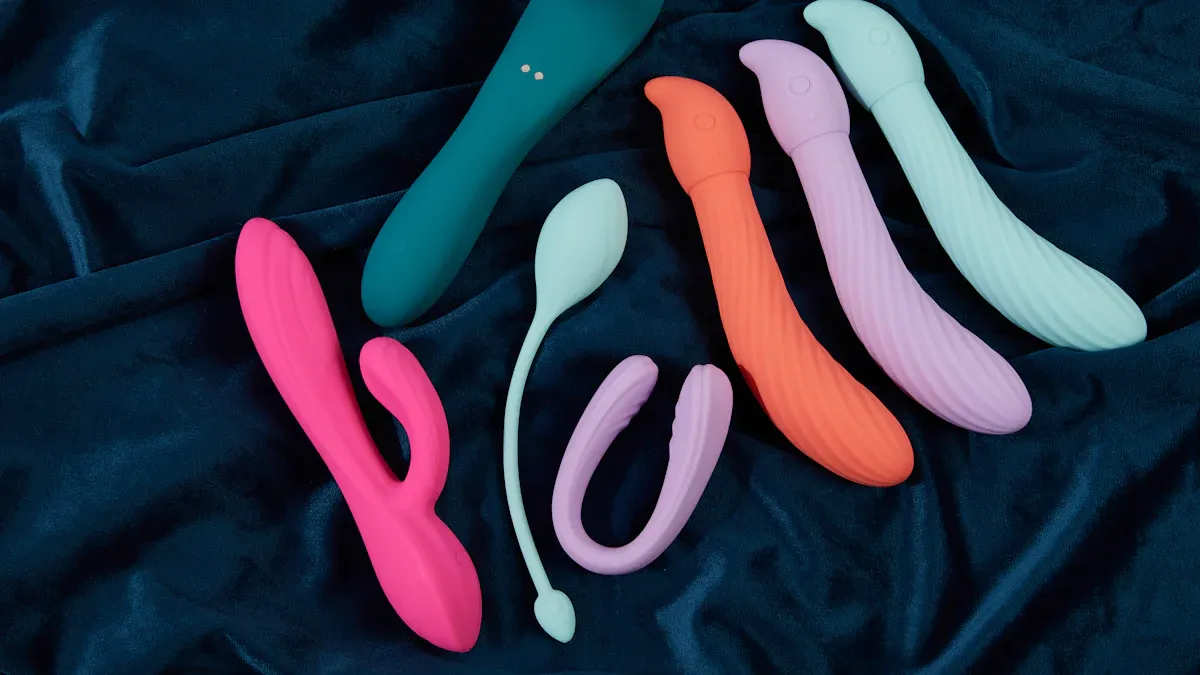
ABS Plastic
When you look for safe and strong dildos, ABS plastic stands out as a top choice. You find this material in many body-safe vibrating toys and even in medical devices. ABS plastic is non-porous, so it does not let germs or fluids get inside. You can clean it easily, and it does not break down with normal use. This plastic is also BPA-free and has high chemical stability. Many companies trust ABS plastic for dildos because it lasts a long time and keeps its shape.
ABS plastic is used in food storage and medical tools, showing its high safety and durability.
It is hard and does not bend, which gives you firm pressure during use.
You often see ABS plastic paired with silicone dildos, where a silicone layer covers the plastic core for extra safety.
Tip: If you want a dildo that is easy to clean and safe for your body, ABS plastic is a smart pick.
TPE, TPR, and PVC
Some dildos use softer plastics like TPE, TPR, or PVC. These materials feel more flexible, but they come with safety concerns. TPE and TPR are porous, which means they have tiny holes that can trap bacteria, mold, and even cleaning chemicals. This makes them hard to sanitize. PVC has a history of using harmful chemicals called phthalates, which can cause health problems. Even if a label says “phthalate-free,” you should stay cautious.
Porous plastics can hold germs and break down over time, which may lead to irritation or infection.
Cleaning these dildos is tough, and you should not share them between partners.
Some companies use medical-grade TPE, but most home cleaning methods cannot fully sterilize these toys.
Regulatory rules for sex toys are not strict, so always buy from brands that share clear safety information.
Note: Many experts suggest using non-porous materials like silicone dildos, glass, or metal to avoid these risks. Some dildos use a plastic core with a silicone coating, giving you the firmness of plastic and the safety of silicone.
Plastic Dildos vs. Other Sex Toy Materials

Safety
Safety is very important when picking a dildo. Different materials have different safety levels. Plastic dildos made from ABS plastic are non-porous. This means germs and fluids cannot get inside. You can clean them easily, and they last a long time. Silicone dildos are also non-porous and safe for your body. They are good for people with allergies because they do not cause skin problems. Glass dildos and metal dildos are non-porous and hypoallergenic. They do not let bacteria grow and do not bother your skin. Stone dildos like jade or quartz are non-porous if polished well. But you should check for cracks that might trap germs.
Some dildos use porous materials like TPE or rubber. These can hold bacteria and are harder to clean. You should not share them with others. Always pick non-porous dildos to keep your body safe.
Tip: Non-porous dildos made from ABS plastic, silicone, glass, metal, or polished stone are the safest for your health.
Sensation
Each material feels different when you use it. Plastic dildos feel hard and smooth. They do not bend, so you get strong pressure. Silicone dildos are softer and can bend more. They can feel like real skin. Glass dildos glide easily and can feel cool or warm. Metal dildos are heavy and very smooth. They give deep pressure and can change temperature. Stone dildos feel cool and solid. They can stay hot or cold for a long time.
If you want a firm toy, plastic, glass, metal, and stone dildos are good. If you want a softer feel, silicone or TPE dildos are better. Many people try different materials to see what they like best.
Durability
Durability is important when buying a sex toy. Plastic dildos made from ABS last a long time. They do not break or crack easily. Silicone dildos are also strong and do not wear out fast. Glass dildos and metal dildos are some of the toughest. They do not scratch and can last for years if you do not drop them. Stone dildos are strong but can break if dropped on something hard.
Porous materials like TPE or rubber do not last as long. They can tear or get sticky over time. You may need to replace them more often.
Cleaning
Cleaning your dildo keeps you healthy. Non-porous materials are easy to clean. You can wash plastic dildos, silicone dildos, glass dildos, metal dildos, and stone dildos with soap and water. You can even boil glass, metal, and some stone dildos to make them extra clean. Plastic dildos made from ABS cannot be boiled, but you can use alcohol or toy cleaner.
Porous dildos like TPE or rubber are harder to clean. They can trap germs inside. Do not share them, and replace them if they smell or change color.
Note: Always read the cleaning instructions for your dildo. Non-porous toys are easier to keep clean and safe.
Price
Price can help you choose which dildo to buy. Plastic dildos are usually the cheapest. They are good for beginners who want to try new shapes and sizes. Silicone dildos cost more but last longer and are safer. Glass dildos and metal dildos are expensive. They can last a lifetime if you take care of them. Stone dildos are also pricey. They are often hand-made and look special.
Here is a table to help you compare the cost, durability, and value of different sex toy materials:
Material | Affordability | Durability & Maintenance | Safety & Hygiene | Consumer Preference & Value |
|---|---|---|---|---|
Plastic | Cheap and budget-friendly | Strong, easy to care for | Some environmental worries, but new recycling options | Good for beginners because of price and simplicity |
Silicone | Costs more | Very strong, easy to clean | Safe for skin, hypoallergenic | Great for long-term use and safety |
Rubber | Low price | Not as strong, can wear out | Can become unsafe over time | Some people buy it for the low price |
Glass | Expensive | Very strong, non-porous | Clean, does not let germs grow | Luxury, pretty, and collected by some people |
Metal | Expensive | Super strong, non-porous | Safe for skin, easy to clean | Liked for weight, temperature play, and lasting use |
Stone | Expensive | Strong if not dropped, non-porous if polished | Clean if no cracks, check for flaws | Liked for looks, temperature play, and being unique |
You can see that plastic dildos are a cheap way to try new things. Silicone dildos, glass dildos, metal dildos, and stone dildos cost more but last longer and are safer. Many people pick these for better value over time.
Pros and Cons of Plastic Dildos
Advantages
Plastic dildos offer several clear benefits. You will notice that these toys often cost less than other options. This makes them a good choice if you want to try different shapes or sizes without spending a lot of money. ABS plastic dildos feel very firm. If you like strong pressure or want a toy that keeps its shape, this material works well. Cleaning is simple because ABS plastic does not have tiny holes that trap germs. You can wash these dildos with soap and water or use a toy cleaner. Many people find that plastic dildos last a long time if you take care of them.
Tip: If you want a toy that is easy to clean and gives firm pressure, plastic dildos are a smart pick.
Drawbacks
Plastic dildos also have some downsides. The hard surface does not feel as lifelike as silicone or latex. If you want a soft, skin-like touch, you may not enjoy the feel of plastic. Some plastic dildos, especially those made from soft PVC, can contain chemicals called phthalates. These chemicals may harm your health and can cause problems over time. Even though rigid ABS plastic is safer and does not have phthalates, you should always check the label before buying. Soft PVC dildos are also porous, which means they can trap germs and are harder to keep clean. You cannot boil plastic dildos to sterilize them, so you need to use other cleaning methods.
Note: Always choose non-porous, phthalate-free dildos from trusted brands to lower your health risks.
Plastic dildos give you a mix of good value, firmness, and easy care. However, you need to watch out for less natural feel and possible chemical concerns. Think about what matters most to you before making your choice.
Choosing Between Different Materials for Dildos
Factors to Consider
When you start buying a new sex toy, you want to make a smart choice. You should look at safety, cleaning, feel, and cost. Not all materials are the same. Some are safer and last longer than others. Here are some important things to think about:
Safety: Always pick body-safe, non-porous materials. Medical-grade silicone, hard plastic, glass, and stainless steel do not soak up germs or fluids. These materials lower your risk of infection and chemical exposure.
Cleaning: Non-porous toys are much easier to clean. You can wash them with soap and water. Some, like glass or metal, can even be boiled to kill germs. Porous toys, like soft jelly plastics, are harder to disinfect. If you use them, put a condom over the toy for extra safety.
Sensation: Each material feels different. Silicone feels soft and flexible. Glass and metal feel firm and can be warmed or cooled for new sensations. Hard plastic gives strong pressure but does not bend.
Durability: Non-porous materials last longer and stay clean over time. Porous toys can break down or get sticky.
Budget: Plastic dildos cost less. Silicone, glass, and metal cost more but give better value because they last longer.
Tip: Always check if your lube matches your toy. Some lubes can damage certain materials.
Personal Preferences
You have your own likes and needs. Think about what feels best for you. Some people want a toy that feels soft and real. Others like toys that are firm and smooth. You might want to try different materials for dildos to see what you enjoy most.
If you care most about safety and easy cleaning, choose non-porous toys.
If you want to explore temperature play, glass or metal can be fun.
If you like strong, steady pressure, hard plastic or metal works well.
If you want a lifelike feel, silicone is a good pick.
Remember: Sex toys are not FDA regulated. You need to check the material and clean your toy before and after each use. Always buy from trusted brands.
Choosing the right material helps you stay safe, feel good, and get the most value from your toy.
When you choose a dildo, you need to think about safety, cleaning, and how it feels. Non-porous options like glass dildos, metal dildos, and stone dildos help you avoid germs and harmful chemicals. Many people prefer these materials because they are easy to clean and last a long time. Porous toys, such as those made from jelly rubber or PVC, can break down and release phthalates, which may cause health problems. You should always check what your toy is made of and clean it often. Picking glass dildos, metal dildos, or stone dildos helps you stay safe and enjoy your experience.

